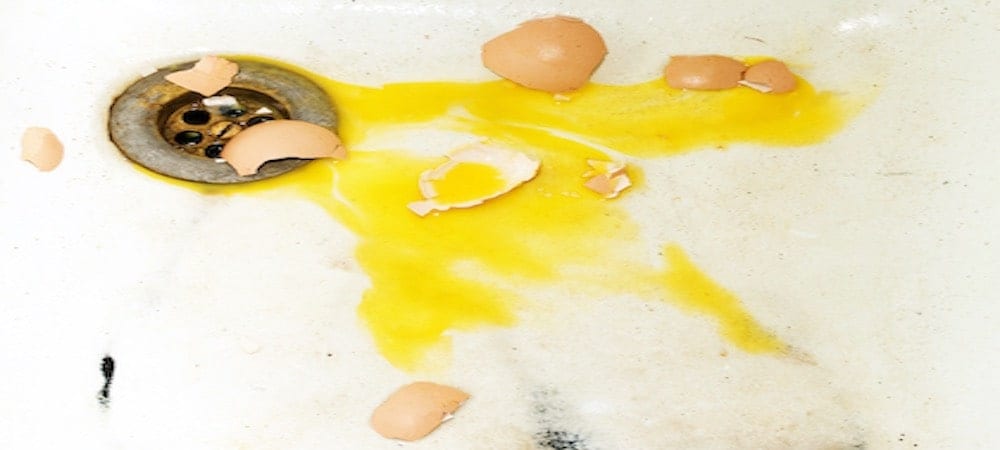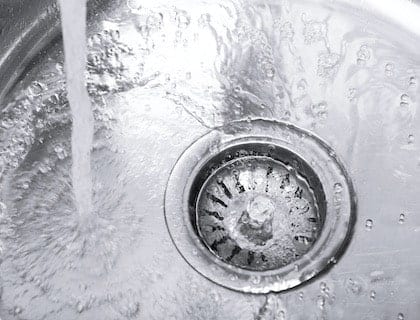
16 Sep Why Does My Water Smell Like Rotten Eggs?
Why Does My Water Smell Funny?
Pure water has no smell, taste, or color. If a homeowner finds that their water smells like rotten eggs, it means a substance near the water is present in such high concentrations that a human can detect an odor. Contamination doesn’t mean that the water is unsafe to drink, but bad smelling water is so off-putting that people find it intolerable.
People will quickly arrange for a plumber to get to the bottom of the problem and drink bottled water in the meantime. Here are some ways water can smell bad and why:
Water Smells Like Rotten Eggs
A common complaint is that the water smells like rotten eggs. This usually means that there’s an excess of sulfur in the water in the form of hydrogen sulfide. A sulfur smell in water is most likely caused by the home’s water heater, especially after sitting unused for a long time. This is a problem if the heater is in a vacation home and is turned off before the homeowner leaves.
The sulfur smell in water happens when anaerobic bacteria in the heater’s water interact with the tank’s anodes. These anodes, which are often made of aluminum and magnesium, are in the tank to attract minerals that would otherwise build up on the heater’s necessary components and shorten its life. But when the anodes are attacked by anaerobic bacteria, which live in an oxygen-free environment, hydrogen sulfide gas is a byproduct.
The human nose is especially sensitive to the smell of hydrogen sulfide gas. The person will detect a musty odor at deficient levels, but the rotten egg smell comes when the concentration rises to at least 1 part per million.
Water That Smells Like Fish
A variety of substances can give water a fishy smell. The water can smell that way because of harmful algal blooms, also called HABS, but chloramines, barium, or cadmium can cause it. Chloramine is a compound formed when an amount of ammonia gets into the water supply and reacts with chlorine.
Barium and cadmium are metals. Barium can infiltrate plumbing pipes and private wells if the property is near a mineral ore that contains the metal. Cadmium is found in the waste product or as a byproduct of chemical fertilizer. These substances can give the water a fishy smell, and if their levels are high enough, they can also be quite toxic.
Like the rotten egg smell, The human nose is sensitive to even small amounts of the compounds that cause an algal bloom’s fishy smell. Algal blooms are overgrowths of algae that appear in bodies of water, including reservoirs. They usually occur in the summer.
If the water isn’t cleaned before it comes into the home, some algae can contaminant it and cause a fishy smell. Water that has algae in it can also smell mildewy or musty from compounds such as 2-methylisoborneol or geosmin.
The smell may be incredibly intense in the late summer when the algae start to die. Like cadmium, barium, and chloramine, algal blooms can be toxic, and the homeowner should contact their water company if they think algae is causing a fishy smell.
Water That Smells of Sewage
Water that reeks of sewage is probably picking that smell up from the drain and plumbing pipes. This smell signifies that organic material has been caught in the drain pipes and attacked, as the anodes in the water heater, by bacteria.
The byproduct is sewer gas, which can be detected when the faucet is turned on, and the gas is pushed up and expelled. Interestingly, the water doesn’t contain the smell. If a glass of water is taken some distance away from the sink and sniffed, there’s no smell.
Though the bad smells from the pipes and bad smells from the water heater seem different, both are caused mainly by hydrogen sulfide.
Water That Smells Like Bleach
If a homeowner smells bleach in their water, it’s a sign that it has an excess of chlorine. Chlorine, which is a rather nasty gas in its pure form, is a crucial disinfectant. It kills pathogens and parasites and is often used to shock well water.
This is one reason why plumbers suggest that a homeowner let their faucets run for a while after they’ve shocked their wells. Though it can be used in strengths as high as 4 milligrams per liter, humans can smell chlorine at much lower levels.
Homeowners may also detect a chlorine smell if their water has to be pumped in from a long distance. Maintaining a remote reservoir might add a bit more chlorine to keep the water clean as it travels.
Water That Smells Like Gasoline
It is unusual for water to smell like gasoline, but it needs to be tended to as soon as possible. The presence of gasoline in the water can cause serious health problems. The homeowner should call their water company and the department of health in their area right away if they notice a gasoline smell in the water. The smell might be caused by a leaking fuel tank, leaking landfills, or runoff from a farm that’s gotten into the water supply.
Benjamin Franklin Plumbing Tyler serves the East Texas cities of Kilgore, Longview, Tyler, and Whitehouse with a team of certified plumbers. In addition to emergency plumbing repair, some of the plumbing services provided by the company include faucet repair, drain services, toilet repair, plumbing fixture installations, tub and shower installations, kitchen sink repair, faucet installation, water heater repair/replacement, and garbage disposal replacement. Call us today at (903) 730-6611 to schedule an appointment!

